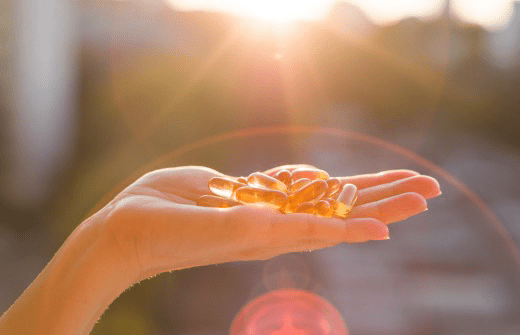Although vitamin K2 is essential for maintaining bone and vascular health and the overall balance of calcium metabolism, it remains overshadowed by more familiar nutrients and is often overlooked - not only by the public but also in official health recommendations. Given its key role in the prevention of osteoporosis and cardiovascular disease, much more attention should be paid to vitamin K2. Both as part of an individual approach to health and in the development of dietary recommendations and prevention strategies.
What will you learn in this article?
- Vitamin K1 vs Vitamin K2
- Why do we need Vitamin K2?
- Why are most people deficient in Vitamin K2?
- How can I tell if I’m lacking Vitamin K2?
- Vitamin K2 Supplementation – What to Focus On
- Dosage
- Drug Interactions
- Conclusion
- Key Takeaways
Vitamin K1 vs Vitamin K2
Vitamin K2 - the underrated vitamin you need more than you think
Vitamins of the K group belong to the fat-soluble vitamins, and there are two basic types - vit. K1, or phylloquinone, and vit. K2, or menaquinone. Some experts argue that vitamin K2 should be clearly separated from vitamin K1 or renamed because it has different functions in the body.
While vitamin K1 is primarily involved in blood clotting (the activation of clotting factors in the liver), vitamin K2 acts primarily outside the liver - promoting calcium deposition in teeth and bones and preventing calcium deposition in blood vessels and soft tissues.

Why do we need Vitamin K2?
Preventing thinning and softening of bones
Vitamin K2 is needed to maintain healthy bones and teeth as it is involved in calcium metabolism. Vitamin K2 activates the protein osteocalcin, which helps build calcium into bones and teeth. Without enough vitamin K2, osteocalcin would not be able to effectively bind calcium and store it in the bones. Vitamin K2 therefore promotes bone strength and density and is involved in reducing the risk of osteopenia or osteoporosis.
Preventing cardiovascular disease
Cardiovascular diseases such as myocardial infarction, stroke and heart failure are the leading cause of death worldwide and in Europe. The main risk factors for heart disease are atherosclerosis and calcification of blood vessels.
Vitamin K2 helps maintain healthy blood vessels by activating (carboxylating) Matrix Gla Protein (MGP), which binds calcium and prevents it from depositing in the walls of blood vessels. If vitamin K2 is deficient, MGP remains inactive and cannot perform its protective function properly. Vit. K2 therefore helps to keep blood vessels flexible, prevents the deposition of atherogenic plaques and the development of arteriosclerosis (hardening of the arteries) and thus the development of heart disease.

Why are most people deficient in Vitamin K2?
Vitamin K1 is found in plant foods, especially green leafy vegetables, and getting enough of it from the diet is not a problem for most people. However, the situation is different for vitamin K2.
Part of vitamin K2 is endogenously produced, or produced by our gut microbiome. In the past, a healthy gut microbiome has been able to provide about half of the required vitamin K2 production. Today, with the changes in lifestyle, dietary habits and thus microbial diversity of the current population, it is estimated that the intrinsic production of vitamin K2 only covers about 10%.
Natural sources of vitamin K2 are only very limited in the diet. The richest source of vitamin K2 is natto, a traditional Japanese dish made from fermented soybeans. Natto contains vitamin K2 in its biologically active form MK-7, which remains in the blood for several days and ensures high bioavailability. One 100g serving of natto per week will thus cover the required dose of vitamin K2.
Other sources include meat, dairy products and eggs from free-range animals (grass-fed quality). Unfortunately, it is very difficult to find such products nowadays. Even if someone includes grass-fed products in their diet, it should be remembered that to get the required amount of vitamin K2, they would need to be consumed regularly about twice a day. Grass-fed meat, dairy products and eggs contain vitamin K2 in the form of MK-4, which has a shorter biological half-life and is therefore only available in the body for a short period of time.

How can I tell if I’m lacking Vitamin K2?
Vitamin K2 deficiency may be manifested by more frequent bleeding (e.g. nosebleeds), a tendency to bruising, heavier menstrual bleeding in women or slower wound healing. Vitamin K2 deficiency may not be apparent for a long time, but its effects can manifest themselves over time in hidden weakening of bone tissue and damage to blood vessels.
Vitamin K2 Supplementation – What to Focus On
From the above, it is clear that regular vitamin K2 supplementation can be a simple but effective step to improve health and prevent serious diseases. Trime's philosophy is to produce products that are as close to nature as possible. We emphasize the natural origin of ingredients and avoid synthetic additives. All of our vitamin K2 products contain the most biologically active form of MK-7, derived naturally through a patented biofermentation process (from chickpeas or natto) and contain no allergenic or synthetic preservatives. At the same time, vitamin K2 MK-7 is in an all-trans configuration (indicating the arrangement of atoms in the molecule), which is more stable, more biologically active and better utilized by the body. (As opposed to the cis-configuration, which is less stable and has reduced activity, or may even be biologically inactive).
Dosage
To ensure the proper functioning of the above processes in our body, a daily dose of 80-120 mcg of vitamin K2 will be beneficial for adults aged 30 years and older. This dose of 120 mcg vit. K2 can be found in the product Vitamin K2 capsules.
In the Daily F20 multivitamin complex, vitamin K2 is found in a daily dose of 75 mcg. This amount allows its combination with Vitatmin D3+K2 in drops, where for every 1000 IU of vit. The combined use of Daily F20 and Vitamine D3+K2 drops is one of the most common combinations of our products, which guarantees the necessary intake of essential nutrients and also allows you to personalize the dosage of vitamin D according to your needs.
For adults over 50 years of age, we recommend supplementing with at least 180 mcg of vitamin K2 daily, as these individuals have an increased risk of bone thinning and osteoporosis. Getting enough vitamin K2 can significantly help protect bones from weakening and softening, thereby reducing the risk of bone fractures.
Vitamin K2 is generally considered very safe even at higher doses. There is no known toxicity associated with high doses of both vitamin K1 and vitamin K2. According to available expert recommendations, the use of vitamin K2 in doses up to 1000 micrograms (mcg) per day is considered safe for most healthy adults.
Drug Interactions
When taking vitamin K2, it is important to take into account possible interactions with certain drugs, especially blood thinners (anticoagulants) such as warfarin (or other coumarin derivatives). These drugs act by inhibiting the action of vitamin K and thus slowing blood clotting. Taking vitamin K2 may reduce the effect of these drugs. When taking anticoagulant drugs, it is advisable to consult a doctor for vitamin K2 supplementation. Conversely, with modern direct anticoagulants that block specific blood clotting factors, vitamin K2 is not usually considered problematic, but caution and individual assessment are also advisable.

Conclusion
Given the growing body of evidence on the importance of vitamin K2 for bone and cardiovascular health, it is time to rethink its role in our diet and health care. Its deficiency is common but overlooked, and yet it can have profound effects on quality of life. Therefore, we recommend paying attention to adequate vitamin K2 intake, either through quality foods (e.g. natto) or through appropriately chosen supplementation.
Key Takeaways
- Vitamin K1 and K2 have different functions: vitamin K1 (phylloquinone) is crucial for blood clotting. Vitamin K2 (menaquinone) affects bone and blood vessel health - it stores calcium in the bones and prevents it from depositing in the blood vessels.
- Vitamin K2 promotes healthy bones and teeth: it activates the protein osteocalcin, which allows calcium to be incorporated into bones and teeth. This contributes to the prevention of osteopenia and osteoporosis.
- Vitamin K2 protects the blood vessels and heart: it activates the MGP protein, which prevents calcium from being deposited in the blood vessel walls. This helps to prevent arteriosclerosis and cardiovascular disease.
- Deficiency of vitamin K2 is common as natural sources of K2 are scarce (e.g. natto, grass-fed eggs and dairy products). Endogenous production by the gut microbiota is much lower today than in the past.
- Vitamin K2 supplementation: the most biologically active form of K2 is MK-7 (especially in the all-trans configuration).
-
Dosage:
- Adults (30+ years): 80-120 mcg daily.
- Persons 50+ years: at least 180 mcg daily
- Safe dosage up to 1000 mcg per day
Studies and points of interest
The well-known Rotterdam Study of 2004 confirmed that long-term intake of vitamin K2 (at a dose of at least 32 mcg per day) reduces the risk of calcification of blood vessels and cardiovascular disease by 50%. [1]
A 2015 clinical trial found that postmenopausal women experienced improved arterial elasticity and reduced arterial stiffness after three years of daily vitamin K2 supplementation (at a dose of 180 mcg). [2]
[1] Geleijnse JM, Vermeer C, Grobbee DE, Schurgers LJ, Knapen MH, van der Meer IM, Hofman A, Witteman JC. Dietary intake of menaquinone is associated with a reduced risk of coronary heart disease: the Rotterdam Study. J Nutr. 2004 Nov;134(11):3100-5. doi: 10.1093/jn/134.11.3100. PMID: 15514282.
[2] Knapen MH, Braam LA, Drummen NE, Bekers O, Hoeks AP, Vermeer C. Menaquinone-7 supplementation improves arterial stiffness in healthy postmenopausal women. A double-blind randomized clinical trial. Thromb Haemost. 2015 May;113(5):1135-44. doi: 10.1160/TH14-08-0675. epub 2015 Feb 19. PMID: 25694037.


















